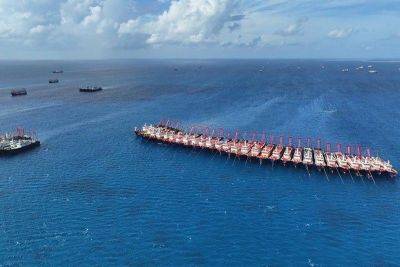‘There’s No Other Job’: The Colonial Roots of Philippine Poverty
Rodino Sawan stepped into the wire harness and dug his toes into the muddy track that threads the sweltering plantation. He pushed forward, straining against the cargo trailing behind him: 25 bunches of freshly harvested bananas strung from hooks attached to an assembly line.
Six days a week, Mr. Sawan, 55, a father of five, tows batches of fruit that weigh 1,500 pounds to a nearby processing plant, often as planes buzz overhead, misting down pesticides. He returns home with aches in his back and daily wages of 380 Philippine pesos, or about $6.80.
One day last year, the plantation bosses fired him. The next day, they hired him back into the same role as a contractor, cutting his pay by 25 percent.
“Now, we can barely afford rice,” Mr. Sawan said. Still, he continued to show up, resigned to the reality that, on the island of Mindanao, as in much of the rural Philippines, plantation work is often the only work.
“It’s an insult,” he said. “But there’s no other job, so what can I do?”
The desperation confronting tens of millions of landless Filipinos stems in part from policies imposed by the powers that controlled the archipelago for centuries — first Spain, and then the United States.
In a region defined by upward mobility through manufacturing, the Philippines stands out as a nation still heavily reliant on agriculture — a legacy of outside rule. Nearly 80 years after the country secured independence, the colonial era still shapes the structure of its economy.
Because the United States opted not to engage in large-scale redistribution of land, families that collaborated with colonial authorities retain oligarchic control over the soil and dominate the political sphere. Policies engineered to make the country dependent on American factory goods have left the Philippines with a much smaller industrial base than many economies in Asia.
“The U.S. forced land reform on a whole lot of different countries in the region, Japan included, because of World War II,” said Cesi Cruz, a political scientist at the University of California, Los Angeles. “But in the Philippines, because they were fighting on the same side, they did not want to punish their ally economically by forcing







